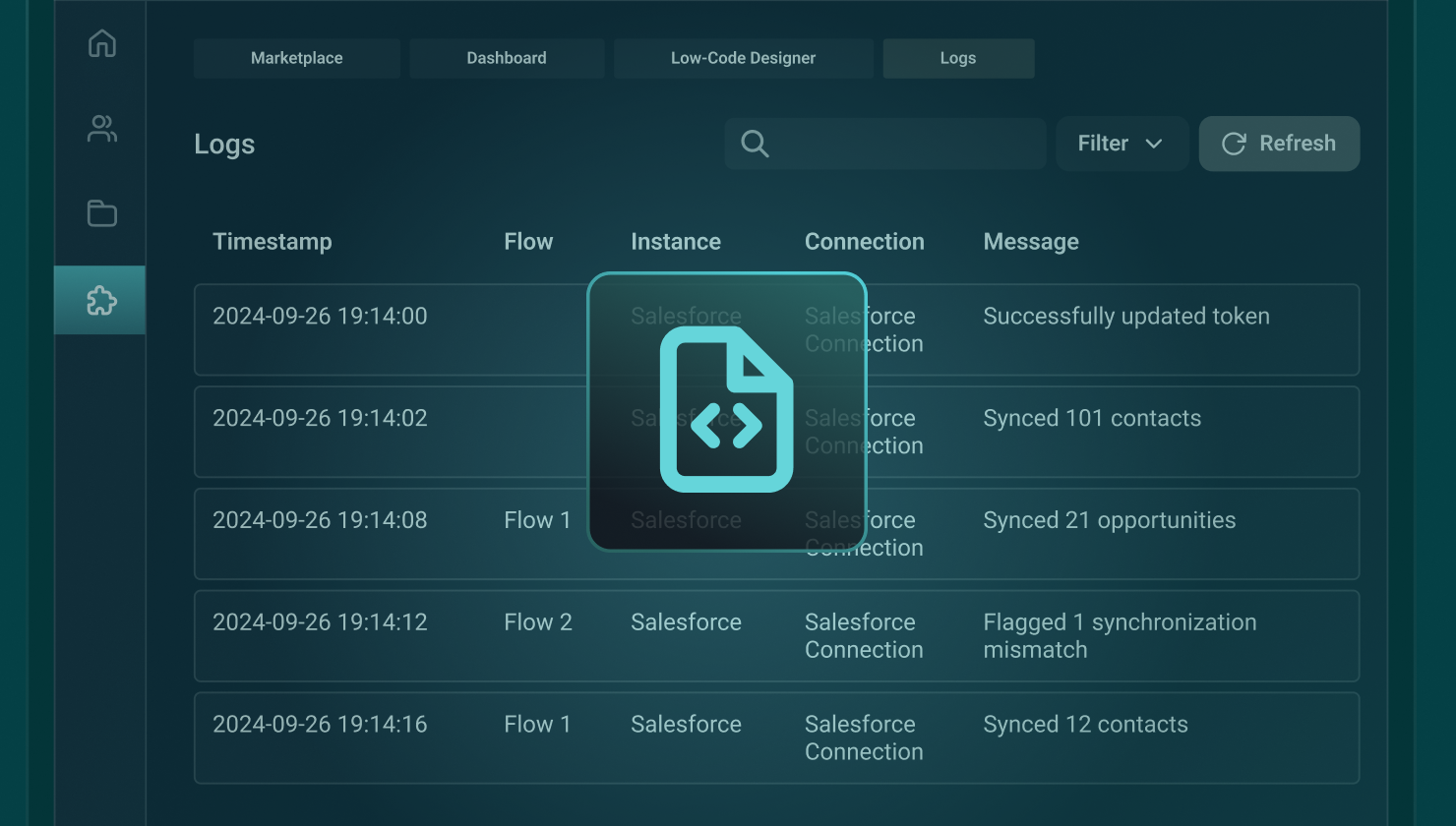If you are a B2B SaaS executive, you may have realized that you must include integrations with your product, but are still seeing them mainly as a necessary evil – something you must provide to customers, which doesn't include a corresponding value for your company.
With Prismatic's embedded iPaaS, you can turn that equation around quickly. Most SaaS companies have a positive integration ROI within a few months of implementing Prismatic.
Beyond the traditional inputs to ROI calculations, you and your team can unlock other benefits that will only grow over time. These include improved customer satisfaction, accelerated sales cycles, and operational insights.
Let's consider how Prismatic can help you create value with your integrations.
Direct cost savings
- Increased engineering efficiency – If you are building integrations in-house, your devs are likely spending anywhere from 25 to 50% of their time building and maintaining those integrations. That's time that should be spent on your core product. With Prismatic, you can reclaim that capacity as your team leverages pre-built components, a custom component SDK, and a low-code builder to empower non-devs to assemble productized integrations. Then, your devs can focus on the critical features that drive your product innovation and customer acquisition.
- Lower infrastructure and hosting expenses – Every one-off integration your team builds adds to your infrastructure. Engineering is managing servers, monitoring systems, and balancing the scaling equation. And none of this is free. With Prismatic, all of the infrastructure is handled out of the box. Your team no longer needs to provision and maintain dedicated integration infrastructure, allowing you to reduce hosting expenses and avoid the ongoing costs of monitoring and maintaining all those one-off integrations.
- Process automation – Manually-assisted integrations aren't only inefficient, but they can also be costly. When your customers have integration needs with your product that you don't meet, they'll create manual workflows that introduce new ways to generate errors and tie up your support team. Using Prismatic to build efficient, data-rich integrations reduces support costs and saves your customers the time they would otherwise spend manually moving data from A to B.
Direct time savings
- Faster time to market – If your competitors have integrations, they aren't waiting to ship them. You shouldn't either. Prismatic enables you to ship new integrations in days or weeks instead of months. The embedded integration marketplace lets prospects and customers see available integrations directly in your app. Your team can jump-start integrations with Prismatic's library of pre-built connectors for common apps. With these tools, you can ship the integrations your prospects and customers want before they go elsewhere.
- Scalability and maintenance – One of the key weaknesses of in-house integration development is that they don't scale well. As you add more integrations, the maintenance overhead becomes unsustainable for any reasonably-sized support team. Prismatic handles the maintenance lift for you. When a third-party API changes, you update one integration, and that update cascades through integration instances for every customer. Do you have highly variable integration usage? The platform scales behind the scenes to ensure the load is managed efficiently. Deploy and manage all the integrations your customers need without adding more headcount.
- Agility and flexibility – Markets change as new technologies (like AI) emerge. At the same time, your customers' requirements are changing. Prismatic lets you respond to market and customer signals without rebuilding your integration architecture. Instead, you can quickly add new integrations as needs arise, rapidly adjust to updated APIs, and otherwise iterate on your integrations without negatively affecting your production environment.
Revenue growth
- New revenue streams – Integrations can help you retain customers, but they are also a great way to increase your customers' spend. Prismatic enables a robust integration ecosystem that lets you capture additional revenue in multiple ways: higher-tier pricing for integration access, usage-based pricing for integrations, and increased revenue from customers with several integrations.
- Expanded market reach – You've probably lost deals because you lacked integrations. With Prismatic, you can say "yes" to many more new integration requests. As a result, you'll win deals that turn on specific integrations, expand into new verticals with their corresponding integration needs, and compete better in your base market (where integrations are table stakes). Every new integration you build makes your product more attractive in the market.
- Greater sales velocity – Integration requirements often stall sales cycles. Understandably, prospects want to be assured that your product will work with their tech stack. Prismatic allows you to demonstrate the integrations you already have, and even quickly build POCs for others that may be needed, removing roadblocks and ensuring that integrations no longer stand in the way of closing deals.
- Increased customer retention – Integrations make it more difficult for customers to switch to another product since the more deeply your product is incorporated into your customers' critical business processes, the stickier it becomes. Prismatic enables you to create robust integrations with the depth and breadth necessary to satisfy every customer. And, as customers add more integrations to your product, that'll make those relationships even stronger.
Friction decrease
- Improved customer experience – Customers don't want another app to access, but they would like your product to integrate with their tech stack. Prismatic delivers this integrated experience. From the integration marketplace to self-service dashboards to the embedded workflow builder, your customers get an in-app integration experience that is a natural extension of your product.
- Competitive differentiation – In a market where SaaS products have feature parity, integrations can be the deciding factor for prospects. With Prismatic, you can rapidly build a wider, more comprehensive selection of integrations than your competitors, demonstrating a solid understanding of customer needs and positioning your product as a market leader.
- Partner ecosystem – Integrations can help customer relationships, but they also help you build relationships with your tech partners. When you build integrations with complementary platforms, you can leverage them to create co-marketing opportunities via partner referrals. Prismatic makes it easier for you to develop and nurture these partnerships.
Operational improvements
- Improved analytics – It's difficult to optimize what you can't measure. Prismatic provides access to the behind-the-scenes data for your integrations. This access allows you to determine which integration is used the most, which is easiest to use (fewest requests for help), which is the most likely to fail (and so might need some attention), and so much more. Use this knowledge to make data-driven decisions about which integrations should be prioritized and how to allocate your resources.
- Increased observability – When integrations fail, and you don't know, it hurts customer relationships. With Prismatic's built-in alerting, you'll know about issues when they happen. You can set up alerts to track key integration statuses, giving your customers real-time integration info. Beyond that, detailed logs enable your teams to troubleshoot and resolve issues efficiently.
- Compliance and security – If you serve regulated industries, integration security and compliance must be top-of-mind. Prismatic provides the infrastructure to meet those requirements. The platform is SOC 2 Type II compliant and provides role-based access controls for integration deployment and management. Adherence to GDPR, CJIS, and HIPAA ensures you can serve a wide range of customers without creating integration compliance frameworks from scratch.
Transform your integration strategy today
The benefits of Prismatic are clear: substantial time and money savings, revenue growth, less friction, and more efficient operations. You'll realize positive ROI in months (not years) and create an integration strategy that will scale with your company and customers.
See how Yoti used Prismatic to create an integration strategy that works.




